Warrendale Wagyu, a Yorkshire-based company processing 30,000 dairy-bred Wagyu cattle across the UK is teaming up with Munster Bovine and Kepak to establish its business in Ireland.
As part of this, it will pay dairy farmers a total of €250 per calf with €200 paid at collection when the calf is four-weeks-old and a €50 slaughter premium also goes back to the breeder.
Dairy farmers using the approved easy-calving Wagyu bulls can expect that set price for both bull and heifer calves. This is the only time there is a set price. After that it’s done on weight and based on a price grid that is set for the year.
Once collected, they will be reared by other farmers. However, there is an option for the dairy farmer to take them through to slaughter if that is the system they run already.
“We have a set price for a calf and after that, we price on a flat rate on an annual basis and then we add a premium for the meat quality. We’re not the market plus a premium. It’s essentially based off cost of production, plus a margin for the people involved in the chain, so it’s not following the marketplace,” said Tom Richardson who was accompanied by his colleague, Jamie Brownrigg.
Wagyu is an easy-calving breed and a colostrum and vaccination protocol is a part of the programme on the breeder’s farm. Calves will be collected and the price paid will be the same for both bull and heifer calves.
Farmers are familiar with the EUROP payment grid but, for Warrendale Wagyu, the focus and one of the chief selling points of its product is based on meat eating quality. This is factored into its pricing mechanism through a marbling bonus. For the company’s Irish venture, it may start off paying a flat-rate price similar to what it did in the UK.
Speaking to the Irish Farmers Journal after the meeting, Tom Richardson said: “It took us two years after we started killing Wagyu cattle until we got a better understanding of the marbling initially and after that we introduced the marbling bonus structure. We do grade on the EUROP grid, but we don’t penalise on it. We incentivise on the marbling.”
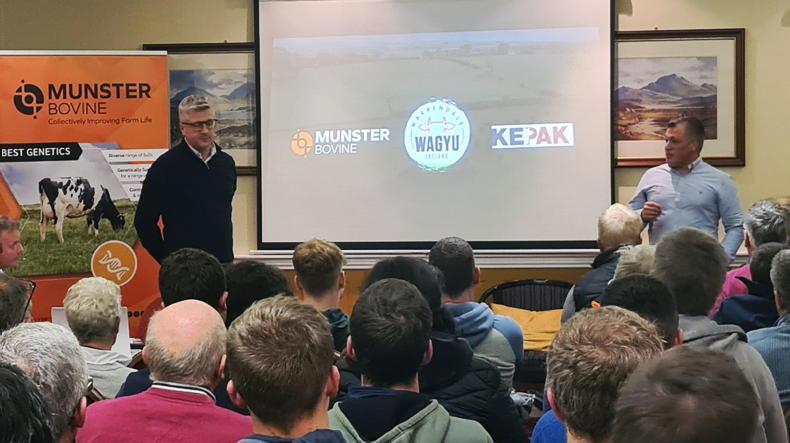
Tom Richardson and Jamie Brownrigg from Warrendale Wagyu addressing farmers at their information event in conjunction with Munster Bovine and Kepak in Clonakilty.
Explaining further, he added: “The Japanese grading system grades on meat marbling, meat colour and fat colour so we’re using one element for that which is marbling. An A5 would be the top grade in Japan but we use a marble score of one to 12.”
Marbling graded automatically
The marbling is graded automatically rather than by eye as they wanted the scoring to be consistent.
Across three meetings in Cork and Limerick last week, the Warrendale Wagyu representatives gave the background to their business and how they have developed it over the last seven years.
The supply chain network they have developed sells to retailers such as Aldi and Waitrose, along with supplying the foodservice sector and export markets. Including 160 dairy farmers who breed the calves they work with 750 farmers throughout the UK, and now process 30,000 Wagyu-cross cattle a year. From their experience in the UK, the average slaughter age is 25 months with a target carcase weight of 330kg to 335kg.
Other requirements of the breeding programme include membership of Bord Bia’s Sustainable Beef and Lamb Assurance Scheme (SBLAS).

A Wagyu fillet. The Wagyu breed is famous for its marbling, where the fat us dispersed throughout the muscle.
Calves must be fully vaccinated and Jersey genetics do not qualify for the programme.
Munster Bovine has a total of 3,000 straws available initially. They cost €19 a piece and the minimum order is 20 straws.
Avoiding small carcase weights
The no-Jersey element drew some questions with a farmer raising the fact that some of the black-and-white herds here have a small mature weight too.
In response, the Warrendale representatives said: “A farmer taking them from start to finish, they know what their animal will achieve, so they won’t be affecting anybody else. I think we would look at that and say if you’re making a commitment to Warrendale and Kepak that you’re serving your animals and taking right through with no moves. Who are we to argue with that?
“We said we didn’t want to go down that [the Jersey] route. Because we want everyone happy and getting a good carcase weight, Jersey genetics do not qualify for the programme as it stands. We had rearers who were disappointed to end up with carcase weights 70kg below average.
We’re only going to get away with that once,” said Brownrigg.

Tom Richardson and Jamie Brownrigg from Warrendale Wagyu with John Tobin and Martin Kavanagh from Munster Bovine at their information event in conjunction with Kepak in Clonakilty.
He added: ‘That was one of the learning curves from the UK. When we first started, we were happy for anybody to put Wagyu straws on any dairy cow whereas now we’re in a position to be more selective in terms of cow size. We want this to be right for everybody.”
Warrendale Wagyu, a Yorkshire-based company processing 30,000 dairy-bred Wagyu cattle across the UK is teaming up with Munster Bovine and Kepak to establish its business in Ireland.
As part of this, it will pay dairy farmers a total of €250 per calf with €200 paid at collection when the calf is four-weeks-old and a €50 slaughter premium also goes back to the breeder.
Dairy farmers using the approved easy-calving Wagyu bulls can expect that set price for both bull and heifer calves. This is the only time there is a set price. After that it’s done on weight and based on a price grid that is set for the year.
Once collected, they will be reared by other farmers. However, there is an option for the dairy farmer to take them through to slaughter if that is the system they run already.
“We have a set price for a calf and after that, we price on a flat rate on an annual basis and then we add a premium for the meat quality. We’re not the market plus a premium. It’s essentially based off cost of production, plus a margin for the people involved in the chain, so it’s not following the marketplace,” said Tom Richardson who was accompanied by his colleague, Jamie Brownrigg.
Wagyu is an easy-calving breed and a colostrum and vaccination protocol is a part of the programme on the breeder’s farm. Calves will be collected and the price paid will be the same for both bull and heifer calves.
Farmers are familiar with the EUROP payment grid but, for Warrendale Wagyu, the focus and one of the chief selling points of its product is based on meat eating quality. This is factored into its pricing mechanism through a marbling bonus. For the company’s Irish venture, it may start off paying a flat-rate price similar to what it did in the UK.
Speaking to the Irish Farmers Journal after the meeting, Tom Richardson said: “It took us two years after we started killing Wagyu cattle until we got a better understanding of the marbling initially and after that we introduced the marbling bonus structure. We do grade on the EUROP grid, but we don’t penalise on it. We incentivise on the marbling.”

Tom Richardson and Jamie Brownrigg from Warrendale Wagyu addressing farmers at their information event in conjunction with Munster Bovine and Kepak in Clonakilty.
Explaining further, he added: “The Japanese grading system grades on meat marbling, meat colour and fat colour so we’re using one element for that which is marbling. An A5 would be the top grade in Japan but we use a marble score of one to 12.”
Marbling graded automatically
The marbling is graded automatically rather than by eye as they wanted the scoring to be consistent.
Across three meetings in Cork and Limerick last week, the Warrendale Wagyu representatives gave the background to their business and how they have developed it over the last seven years.
The supply chain network they have developed sells to retailers such as Aldi and Waitrose, along with supplying the foodservice sector and export markets. Including 160 dairy farmers who breed the calves they work with 750 farmers throughout the UK, and now process 30,000 Wagyu-cross cattle a year. From their experience in the UK, the average slaughter age is 25 months with a target carcase weight of 330kg to 335kg.
Other requirements of the breeding programme include membership of Bord Bia’s Sustainable Beef and Lamb Assurance Scheme (SBLAS).

A Wagyu fillet. The Wagyu breed is famous for its marbling, where the fat us dispersed throughout the muscle.
Calves must be fully vaccinated and Jersey genetics do not qualify for the programme.
Munster Bovine has a total of 3,000 straws available initially. They cost €19 a piece and the minimum order is 20 straws.
Avoiding small carcase weights
The no-Jersey element drew some questions with a farmer raising the fact that some of the black-and-white herds here have a small mature weight too.
In response, the Warrendale representatives said: “A farmer taking them from start to finish, they know what their animal will achieve, so they won’t be affecting anybody else. I think we would look at that and say if you’re making a commitment to Warrendale and Kepak that you’re serving your animals and taking right through with no moves. Who are we to argue with that?
“We said we didn’t want to go down that [the Jersey] route. Because we want everyone happy and getting a good carcase weight, Jersey genetics do not qualify for the programme as it stands. We had rearers who were disappointed to end up with carcase weights 70kg below average.
We’re only going to get away with that once,” said Brownrigg.

Tom Richardson and Jamie Brownrigg from Warrendale Wagyu with John Tobin and Martin Kavanagh from Munster Bovine at their information event in conjunction with Kepak in Clonakilty.
He added: ‘That was one of the learning curves from the UK. When we first started, we were happy for anybody to put Wagyu straws on any dairy cow whereas now we’re in a position to be more selective in terms of cow size. We want this to be right for everybody.”








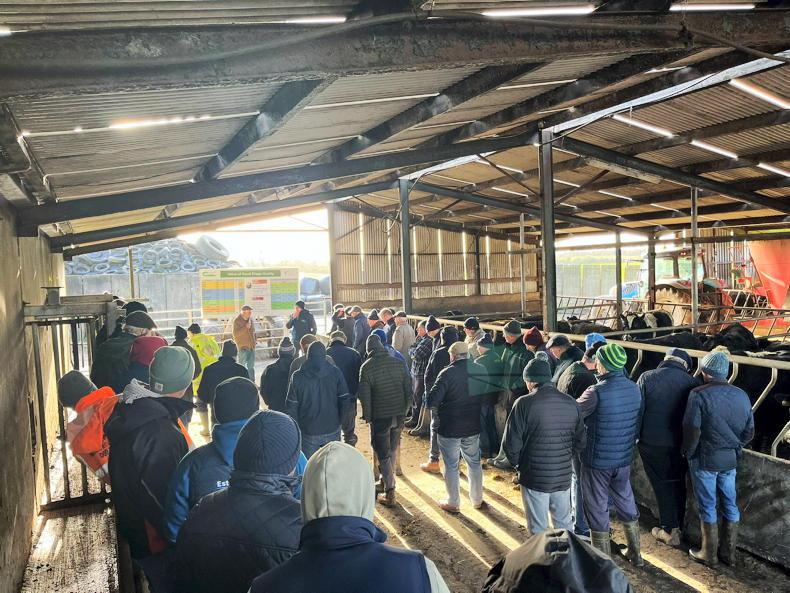

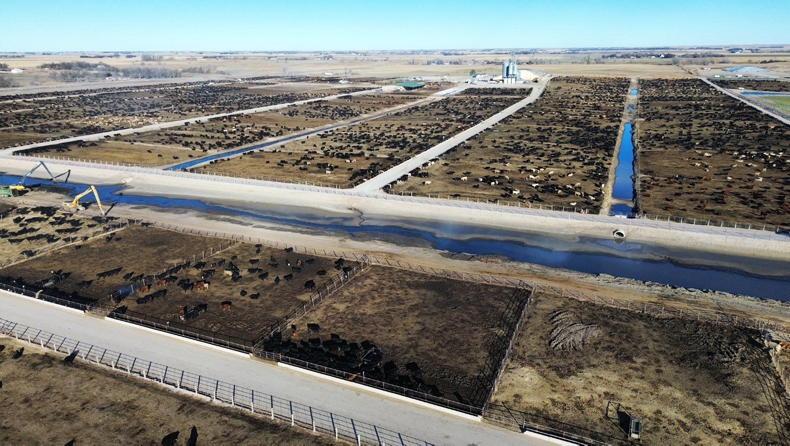
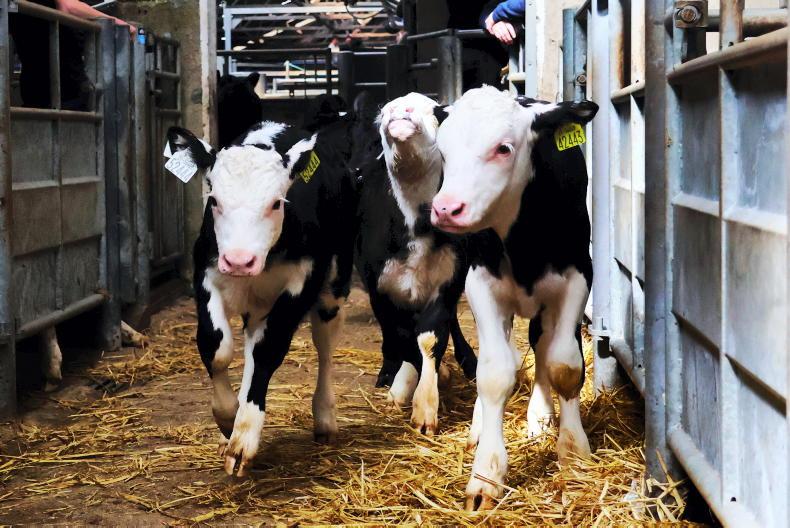
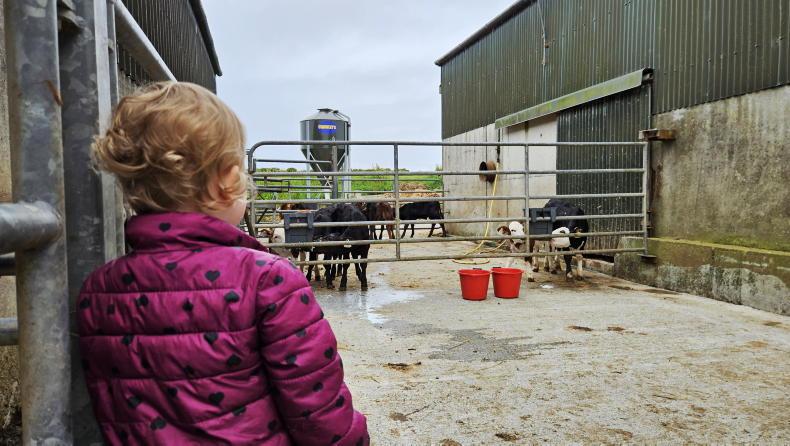
SHARING OPTIONS